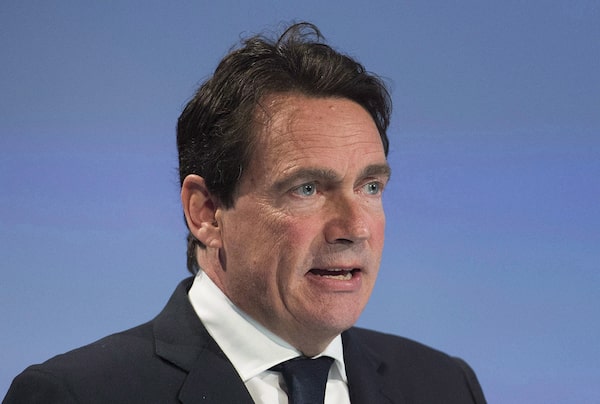
Pierre Karl Peladeau speaks at Quebecor's annual general meeting in Montreal on May 11, 2017.Graham Hughes/The Canadian Press
Pierre Karl Péladeau’s bid for Air Transat (TRZ-T) has put the Trudeau government in the uncomfortable position of having to choose between the beleaguered airline’s takeover by archrival Air Canada and a long-shot offer from the Quebec businessman that he says would preserve competition and ensure Transat’s independence.
Montreal-based Transat’s takeover by Air Canada (AC-T) would eliminate consumer choice on a slew of transatlantic and Caribbean flights, and potentially lead to a hefty increase in ticket prices if demand rebounds after the pandemic. But it would at least ensure that Transat ends up in the hands of an experienced operator and preserve hundreds of jobs at the struggling carrier.
Mr. Péladeau, whose offer remains on the table despite being initially rejected by Transat’s board in November, says he would maintain Transat as a direct competitor to Canada’s flag carrier. Ottawa’s rubber stamping of the Air Canada takeover would not be without political risks, especially in Quebec, where Transat is seen as a spunky homegrown brand.
It is not clear that anyone in Ottawa takes Mr. Péladeau seriously. The Quebecor chief, who launched his bid for Transat through his private holding company Gestion MTRHP Inc., has never run an airline. His only association with the transportation sector remains his recent purchase of a bankrupt Montreal electric taxi venture that had tried and failed to take on Uber.
Still, as The Globe and Mail reported on Monday, Mr. Péladeau thrice wrote in recent weeks to Marc Garneau – who was replaced as transport minister in a cabinet shuffle Tuesday by Mississauga Centre MP Omar Alghabra – asking him to block Air Canada’s takeover in favour of his bid for Transat. His missives would likely have been laughed off were it not for Ottawa needing a Plan B if the European Commission rejects the Air Canada deal on competition grounds, which it could do as early as next month.
Indeed, Mr. Péladeau appears to banking on it.
In announcing an investigation into the Air Canada-Air Transat merger last May, European competition chief Margrethe Vestager expressed serious concerns about the elimination of consumer choice on several Canada-Europe routes. “Mergers have long-term structural effects on competition, which need to be considered even in times of severe shocks affecting the economy,” she said.
In other words, the pandemic is no reason to go easy on aspiring monopolists.
Gestion MTRHP – the name comes from the first initials of Mr. Péladeau’s four children and the family name – has hired Brussels-based competition lawyer Bernard Amory to represent it before European Commission. Mr. Amory, of the firm Jones Day, previously worked for Bombardier as the Montreal-based firm sought European approval for the sale of its rail division to French giant Alstom. Mr. Amory does not come cheap, and his hiring suggests Mr. Péladeau, who last fall mused about making a bid for Cirque du Soleil, is more serious about his desire for Air Transat.
Transat’s board has come under fire for not disclosing Mr. Péladeau’s bid to shareholders before they voted on Air Canada’s revised takeover offer of $5 cash a share, or 0.2862 Air Canada shares, on Dec. 15. At the time, Transat chairman and chief executive officer Jean-Marc Eustache only revealed that the company had received a last-minute “unsolicited offer from a private investor” but had deemed that it “did not constitute a superior proposal” to Air Canada’s bid.
In a Nov. 23 letter to Mr. Garneau, Mr. Péladeau insisted his $6-a-share offer was “significantly more advantageous” than Air Canada’s bid. But Mr. Eustache said on Dec. 15 that by opting to take Air Canada shares instead of cash, Transat shareholders “can benefit from subsequent increases in the value of Air Canada shares” as air travel recovers after the pandemic.
On Tuesday, Transat shot back at Mr. Péladeau, saying his offer “lacks binding, fully committed financing” and is worth only $5 a share if the Air Canada transaction is rejected by regulators. Transat director Jean-Yves Leblanc said Mr. Péladeau’s offer “appears designed to attempt to adversely influence the regulatory approval process by suggesting that an alternative exists.” But Air Canada’s “proposal continues to be the best option for Transat’s future,” he said.
More than 90 per cent of Transat shareholders voted to approve the Air Canada deal, including the carrier’s largest shareholder, Montreal-based investment firm Letko, Brosseau & Associates Inc., which holds a 13.7-per-cent stake. So did Caisse de dépôt et placement du Québec, with 6 per cent. Neither has publicly expressed any enthusiasm for a bid by Mr. Péladeau.
Even Quebec Premier François Legault, who co-founded Air Transat alongside Mr. Eustache more than three decades ago, has expressed reluctant support for Air Canada’s purchase, at best saying he told Air Canada executives he hoped to see “a little of Air Transat’s blue in [Air Canada’s] airplanes and marketing.” Mr. Legault and Mr. Péladeau were political rivals when the latter briefly led the Parti Québécois. He will not go out of his way to help him now.
Mr. Péladeau’s only hope for owning an airline likely lies with European regulators.
Your time is valuable. Have the Top Business Headlines newsletter conveniently delivered to your inbox in the morning or evening. Sign up today.